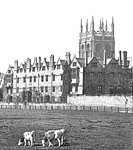Chapter 29. "Coherence Theory of Truth" by Harold H. Joachim

Merton College, Oxford, Library of Congress
About the author…
The Idealist Harold H. Joachim (1868-1938), a professor of logic at Merton College, Oxford, is one of several philosophers who formulated an idealist conception of truth. His theory articulated the concept of "truth-or-knowledge." Joachim's teaching influence helped maintain British Idealism as a viable philosophy until the outbreak of World War II. His notion of truth as a "living and moving whole" as stated below in our reading selection from "The Coherence-Notion of Truth" in The Nature of Truth; An Essay resembles the dialectic in Hegelian idealism.
About the work…
In his The Nature of Truth; An Essay,[1] Harold H. Joachim gives one of the classic statements of the coherence theory of truth. On his view, human truth is incomplete, for there can be no absolute truth unless the whole system of knowledge could be completed. Whatever is true not only is consistent with a system of other propositions but also is true to the extent that it is a necessary constituent of a systematic whole. Joachim emphasizes that since the truth is a property of the whole, individual propositions are only true in a derivative sense—literally they are partly true and partly false. Only the system of an extensive body of propositions as a whole can be rightly said to be true.
Ideas of Interest from The Nature of Truth
Explain Joachim's characterization of what is conceivable. How does his use of the term differ from a good lexical definition of "conceivable"?
Summarize Descartes' theory of knowledge as recounted by Joachim. How does Joachim's theory of the systematization of knowledge differ from Descartes' theory?
Summarize the difference between truth and validity as expressed in formal logic. According to Joachim, why cannot formal logic guarantee truth? How does Joachim's "systematic coherence" differ from the "consistency" or the "validity" of formal logic?
Summarize Joachim's description of the coherence theory of truth.